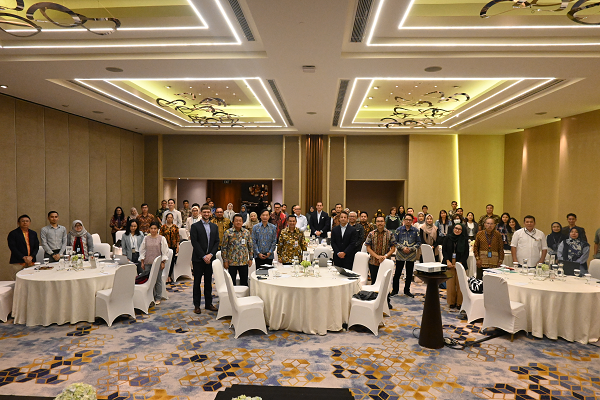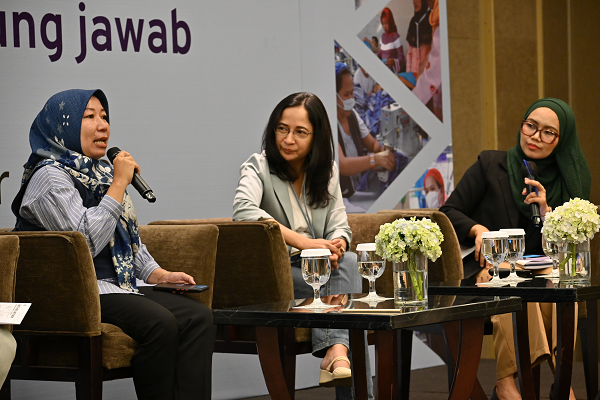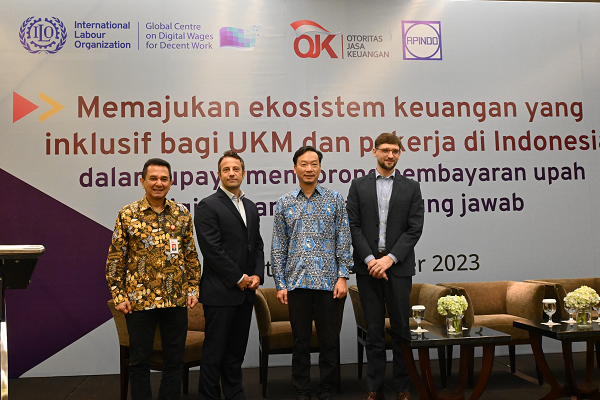Contact us: digitalwages@ilo.org
ILO, OJK and APINDO engage Indonesian financial and payroll service providers in the promotion of responsible digital wage payments

The ILO’s Global Centre on Digital Wages for Decent Work, Indonesia Financial Services Authority (OJK) and the Indonesian Employers Association (APINDO) brought together financial and payroll service providers from the Greater Jakarta Area for the workshop “Advancing an inclusive financial ecosystem that enables responsible digital wage payments for small and medium-sized enterprises (SMEs) and workers in Indonesia.”
The full-day event aimed to explore the challenges and opportunities faced by the financial sector in responsibly supporting SMEs and workers during the transition from cash to digital wage payments. It gathered more than 75 participants representing financial and payroll service providers, government ministries, employers’ and business associations, trade unions and partner organizations.
The event comprised two main panels. The first panel was moderated by APINDO and concentrated on strategies for service providers to enhance engagement with SMEs through tailored digital payroll and wage payment solutions.

The Indonesia Payment System Association presented the landscape of digital payment ecosystems in the country and discussed the role of the Central Bank of Indonesia. Mekari, Bank DKI and Bank BJB shared good practices in financial services and payroll digitization to SMEs in urban and rural areas. Additionally, the Indonesian Fintech Association discussed strategies to leverage the rapidly evolving digital payment ecosystem in the country to encourage digital wage payments. Challenges in the enabling environment, such as digital infrastructure and data security, were acknowledged as obstacles. However, panellists highlighted the potential of digital wage payments to facilitate business formalization.
The second panel centred on the challenges of providing digital wage payment solutions to workers. Panellists emphasized concerns regarding consumer protection and financial and digital literacy, particularly among vulnerable groups such as rural workers, those in the informal sector, women and migrants.

Bank BRI and Dana Indonesia presented tested solutions aimed at fostering the financial inclusion of workers in these demographics. Representatives from the Ministry of Manpower and trade unions highlighted the need for digital and financial education to safeguard workers from falling victim to fraud and overindebtedness. Panellists also pointed to the advantages of broader access to financial products and services, including savings, credit and insurance.
According to Arief Budiman, Deputy of Micro, Small & Medium-sized Enterprises from APINDO, the financial inclusion of SMEs and workers also need to consider aspects such as consumer protection, integrity and stability of the financial system.
Following the main sessions, participants engaged in a group discussion addressing the challenges faced by SMEs and workers when accessing financial services and potential solutions. Participants emphasized the need for enhanced integration and lowered transaction costs within payment systems and highlighted the importance of financial and digital education for both workers, business owners and HR managers. Additionally, there was a call for dialogue among regulators, service providers and employers, with a specific focus on workers’ financial well-being.
Roberto Akyuwen, Head of OJK’s Office of Jakarta, Bogor, Depok, Bekasi and Banten Province, pointed that despite the increasing trend of digitalization and economic growth in the recent decades, the practice of wage digitization in Indonesia remains relatively low, with a significant portion of workers still receiving their wages in cash. This reliance on cash payments poses several challenges, namely security risks, limited access to financial services products and additional administrative burden for the employers to manually record their cash payments. Wage digitization is not merely a technological advancement, it is a catalyst for financial inclusion, improved worker welfare and enhanced economic productivity.
The valuable insights shared in the workshop will help strengthen the collaboration between the ILO’s Global Centre on Digital Wages for Decent Work and OJK. This collaboration aims to engage financial service providers in the digital wages agenda over the coming months.
